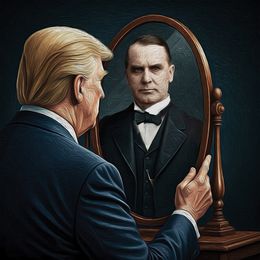“Who is John Galt?” That’s the haunting opening line in Ayn Rand’s iconic novel Atlas Shrugged. Today, we ask, “Who is William McKinley?”, the man who profoundly influenced President Donald Trump’s tariff war against the world. Speaking in his typical hyperbolic, repetitive, vocabulary-challenged style, Trump explained to podcaster Joe Rogan, “McKinley was the tariff king. He spoke beautifully of tariffs. His language was really beautiful. We will not allow the enemy to come in and take our jobs and take our factories and take our workers and take our families, unless they pay a big price and the big price is tariffs.”
McKinley was the 25th president of the US (1897-1901), a forgotten man resurrected by Trump’s tariff obsession. McKinley introduced the 1897 Dingley Tariff Act to ring-fence America’s nascent domestic industry from foreign competition. The reasoning: expensive imports would encourage Americans to buy local products, establish factories and create jobs. Tariffs brought revenue, but also recession. Low-income families that depended on cheap imported food and household essentials suffered badly.
Trump’s punitive tariff rates seem inspired more by McKinley’s guidelines than modern math. At 50 per cent, McKinley’s tariffs were among the highest in US history. Trump’s tariff rates shock and puzzle the world. Laments American economist Michael Strain, “We are seeing shocking ignorance about how the global economy works, shocking incompetence in the planning and execution of economic policy.” Australia’s volcanic Norfolk islands, home to 2,200 inhabitants, was slammed with 29 per cent tariffs, 300 times more than the tariff imposed on mainland Australia. If the math is weird, some tariff targets are weirder. Tariff is imposed on Heard and McDonald Islands in the Antarctic inhabited by penguins and seals. A baffled Australian Prime Minister Anthony Albanese described the tariffs as “a bit strange”.
Other than Trump-sycophants, most experts say tariff is an outdated economic tool. It made sense when the US traded in sugar and tin. Global economy now is sophisticated, complex and interwoven. iPhone has parts from 43 countries. Apple lost $310 billion in share value; global markets $7 trillion—that’s the annual GDP of the UK and France wiped out in 48 hours. “Trump dropped a nuclear bomb on the global trading system,” accuses Harvard economist Ken Rogoff. Trump promises a golden age; critics fear inflation, depression, unemployment and a currency war. His tariff goal of bringing traditional manufacturing back to the US is quixotic. He seems a 20th century populist using 19th century tools to fight 21st century economic battles.
But Trump has been consistent in his trade tirade. For 40 years, he has ranted against Japanese and Saudi trade surpluses and protectionism. In his “Liberation Day” tariff speech, Trump called foreign leaders “scavengers” who “looted, pillaged, raped, plundered… and tore apart our once-beautiful American dream”. A zero-sum warrior bearing grudges and resentments, Trump is also a nostalgic McKinley acolyte wallowing in past glory—“Our country was the richest in the 1880s, 1890s.”
McKinley hoped but failed to persuade Spain to grant independence to separatist Cuba. Dealmaker Trump struggles to be peacemaker between Russia and Ukraine. Atlas Shrugged ends loftily—“The man who will bring the world to its new height is John Galt.” That’s fiction. McKinley was shot dead at point blank range at an exhibition. His assassin, Leon Czolgosz, was an anarchist who believed the massive powers of the presidency were too big for one man. McKinley was called the “Napoleon of Protection”, a moniker implying strength and defeat. He was also a flip-flopper. His other nickname was Wobbly Willie.
Pratap is an author and journalist.


